[…]
on the cutting edge of this field, neuroscientists have more recently developed brain implants that can turn neural signals directly into whole words. These brain-computer interfaces (BCIs) largely require users to physically attempt to speak, however—and that can be a slow and tiring process. But now a new development in neural prosthetics changes that, allowing users to communicate by simply thinking what they want to say.
The new system relies on much of the same technology as the more common “attempted speech” devices. Both use sensors implanted in a part of the brain called the motor cortex, which sends motion commands to the vocal tract. The brain activation detected by these sensors is then fed into a machine-learning model to interpret which brain signals correspond to which sounds for an individual user. It then uses those data to predict which word the user is attempting to say.
But the motor cortex doesn’t only light up when we attempt to speak; it’s also involved, to a lesser extent, in imagined speech. The researchers took advantage of this to develop their “inner speech” decoding device and published the results on Thursday in Cell. The team studied three people with amyotrophic lateral sclerosis (ALS) and one with a brain stem stroke, all of whom had previously had the sensors implanted. Using this new “inner speech” system, the participants needed only to think a sentence they wanted to say and it would appear on a screen in real time. While previous inner speech decoders were limited to only a handful of words, the new device allowed participants to draw from a dictionary of 125,000 words.
[…]
“Largely, [there was] a lot of excitement about potentially being able to communicate fast again,” she says—adding that one participant was particularly thrilled by his newfound potential to interrupt a conversation—something he couldn’t do with the slower pace of an attempted speech device.
To ensure private thoughts remained private, the researchers implemented a code phrase: “chitty chitty bang bang.” When internally spoken by participants, this would prompt the BCI to start or stop transcribing.
[…]
Source: New Brain Device Is First to Read Out Inner Speech | Scientific American

Robin Edgar
Organisational Structures | Technology and Science | Military, IT and Lifestyle consultancy | Social, Broadcast & Cross Media | Flying aircraft

